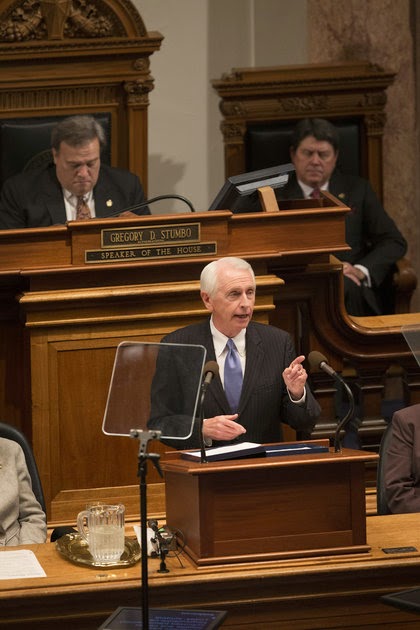Beshear: Improving health means progress on other issues

 |
| Associated Press photo by David Stephenson |
While Kentucky has led the way on many health fronts with the implementation of electronic health records, expansion of Medicaid under federal health reform and a “nation-leading health benefit exchange,” Beshear said, it still ranks “among the worst, if not the worst, in almost every major health category.”
He said those issues are broader than people think: “There is a direct line from poor health to almost every core challenge Kentucky faces, whether that’s poverty, unemployment, low education attainment, substance abuse or crime.”
Almost 30 percent of the governor’s speech was spent talking about health related issues and the success of the Affordable Care Act in Kentucky.
Beshear reiterated his support for a comprehensive,statewide smoke-free ban and encouraged lawmakers to pass this ban about mid-way through the speech, spending a little over two minutes giving facts about the ill effects of smoking to our state. He noted that the state leads the nation in smoking “and when it comes to preventable illnesses and deaths, every single study concludes that nothing is as devastating to Kentucky as smoking and tobacco use.”
A new poll shows that 66 percent of Kentucky adults favor a statewide smoking ban and 29 percent oppose it, but it has never come to a vote on the floor of either chamber of the legislature. However, on Monday, House Speaker Greg Stumbo said the time had come for a floor vote in the House.
Terry Brooks, executive director of Kentucky Youth Advocates said in a prepared statement after the speech, “A comprehensive statewide smoke-free law will protect children today and, by protecting pregnant women from secondhand smoke, that law will protect unborn babies as well.”
Another big health issue in Kentucky is heroin,”and it’s getting worse every day,” Beshear said.
“In 2011, 5 percent of people who died from drug overdoses in Kentucky had heroin in their bloodstream. In 2013, that had risen to 32 percent,” he said. He also cited that the number of heroin cases sent to the Kentucky State Police crime lab for analysis had increased by 340 percent in the last five years.
In response to this epidemic, Beshear asked for legislation to expand access to drugs that immediately reverse the effects of overdoses, saying that such drugs will protect law enforcement and health care workers from needle sticks and will expand access to treatment.
He also asked for legislation that will enhance penalties for major traffickers and will protect users from minor drug charges when they call 911 to help an overdose victim. “No single change in the law is enough,” he said. An anti-heroin bill failed last year because each chamber wanted the measure to do something the other chamber didn’t want.
On other issues related to health, Beshear asked for legislation to increase the age and weight requirement for booster seats and to create an expansion of court protective orders for dating partners.
Beshear closed by asking the lawmakers to put aside things like “partisan bickering, pending elections and Twitter-feed rhetoric” and to “”Join with me in continuing to improve our health, our workforce, our families and our economy.”